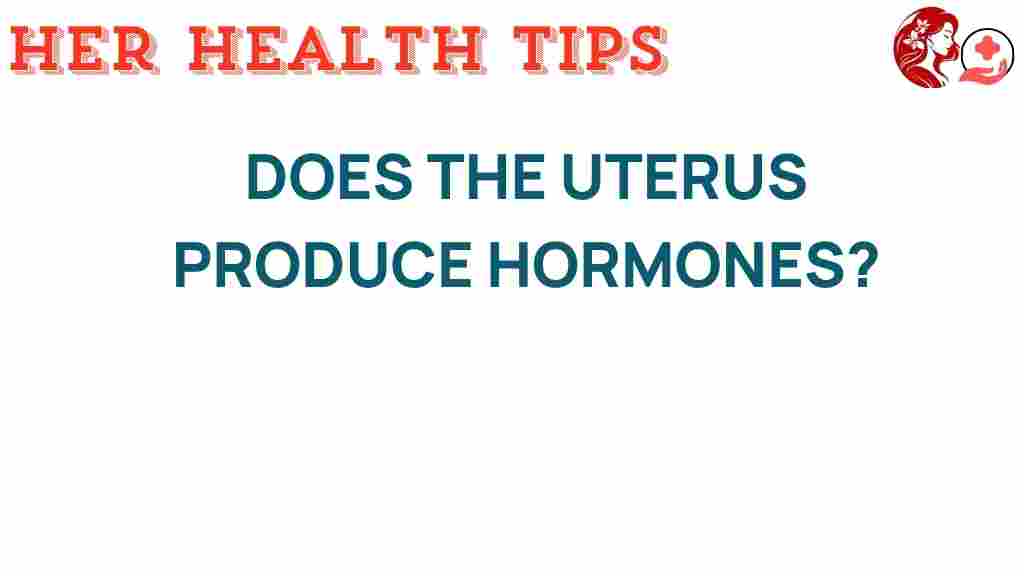Unlocking the Mystery: Does the Uterus Produce Hormones?
The female reproductive system is a complex network that plays a crucial role in women’s health, fertility, and overall hormonal balance. One of the key components of this system is the uterus, often thought of primarily as the site of pregnancy. However, many women wonder, does the uterus produce hormones? This article delves into the intricate relationship between the uterus and hormones, focusing on estrogen and progesterone, and their impact on reproductive health and the endocrine system.
Understanding the Uterus and Its Role in Hormone Production
The uterus is a muscular organ located in the pelvis, and its primary function is to house and nourish a developing fetus during pregnancy. While the uterus itself does not produce hormones in the same way the ovaries or adrenal glands do, it plays a significant role in responding to hormones that regulate the menstrual cycle and pregnancy.
Hormones are chemical messengers that travel through the bloodstream and influence various bodily functions, including:
- Menstrual cycle regulation
- Ovulation
- Pregnancy maintenance
- Bone health
- Heart health
Key hormones involved in these processes include estrogen and progesterone, which are primarily produced by the ovaries but have significant effects on the uterus.
The Role of Estrogen and Progesterone
Estrogen and progesterone are critical for reproductive health. Understanding their roles can help clarify how the uterus responds to hormonal changes throughout a woman’s life.
Estrogen
Estrogen is a group of hormones that play a vital role in the development and regulation of the female reproductive system. In terms of the uterus, estrogen:
- Stimulates the growth of the uterine lining (endometrium) during the menstrual cycle.
- Promotes blood flow to the uterus.
- Plays a role in the regulation of the menstrual cycle.
Progesterone
Progesterone is another key hormone that is crucial for reproductive health. Its primary functions include:
- Preparing the uterine lining for implantation of a fertilized egg.
- Maintaining the uterine lining during early pregnancy.
- Regulating the menstrual cycle and preventing further ovulation during pregnancy.
Both hormones are essential for maintaining hormonal balance, which is critical for fertility and reproductive health.
The Uterus and the Endocrine System
The uterus is part of the broader endocrine system, which is responsible for hormone production and regulation throughout the body. Although the uterus itself does not produce hormones, it is influenced by the hormones secreted by other glands, particularly the ovaries.
Here’s how the interaction works:
- The hypothalamus in the brain signals the pituitary gland to release hormones.
- The pituitary gland releases follicle-stimulating hormone (FSH) and luteinizing hormone (LH), which stimulate the ovaries.
- The ovaries produce estrogen and progesterone, which then affect the uterus.
The Menstrual Cycle and Hormonal Influence
The menstrual cycle is typically around 28 days and is divided into several phases, during which the levels of estrogen and progesterone fluctuate. Here’s a breakdown of how this cycle works:
- Follicular Phase: Begins on the first day of menstruation. Estrogen levels rise, leading to the thickening of the uterine lining.
- Ovulation: Triggered by a surge in LH, leading to the release of an egg from the ovary.
- Luteal Phase: After ovulation, progesterone levels increase to prepare the uterus for potential implantation of a fertilized egg. If fertilization does not occur, hormone levels drop, leading to menstruation.
Impact of Hormonal Imbalance on Women’s Health
Hormonal imbalances can significantly affect women’s health, leading to various reproductive issues. Some common symptoms of hormonal imbalance include:
- Irregular menstrual cycles
- Heavy or painful periods
- Weight gain or loss
- Fatigue
- Fertility issues
Conditions such as polycystic ovary syndrome (PCOS), endometriosis, and uterine fibroids can all be influenced by hormonal imbalances. It is essential for women to monitor their reproductive health and consult healthcare providers for any concerning symptoms.
Maintaining Hormonal Balance for Optimal Reproductive Health
Maintaining hormonal balance is crucial for reproductive health. Here are some strategies to promote hormonal balance:
- Healthy Diet: Incorporating whole foods, healthy fats, and plenty of fruits and vegetables can support hormonal health.
- Regular Exercise: Physical activity can help regulate hormones and improve overall health.
- Stress Management: Practicing mindfulness, yoga, and other stress-reduction techniques can help balance hormones.
- Regular Check-Ups: Regular visits to a healthcare provider can help monitor hormonal health and detect any imbalances early.
When to Seek Help
If you experience symptoms of hormonal imbalance, it is essential to seek help from a healthcare provider. Here are some signs that you should consult a professional:
- Severe menstrual irregularities
- Persistent fatigue or mood changes
- Difficulty conceiving
- Significant weight changes
Healthcare providers may conduct tests to measure hormone levels and recommend treatments tailored to individual needs, such as lifestyle changes, medications, or hormone therapy.
Conclusion: The Uterus and Hormonal Influence
In summary, while the uterus does not produce hormones directly, it is a vital organ influenced by hormones produced by the ovaries and other glands in the endocrine system. Understanding the relationship between the uterus and hormones like estrogen and progesterone is crucial for women’s health and reproductive wellness. Maintaining hormonal balance is essential for menstrual health, fertility, and overall well-being. For further information on hormonal health and its importance, check out this resource.
By staying informed and proactive about reproductive health, women can navigate hormonal changes more effectively and ensure their overall health and well-being.
This article is in the category Reproductive and created by HerHealthTips Team
